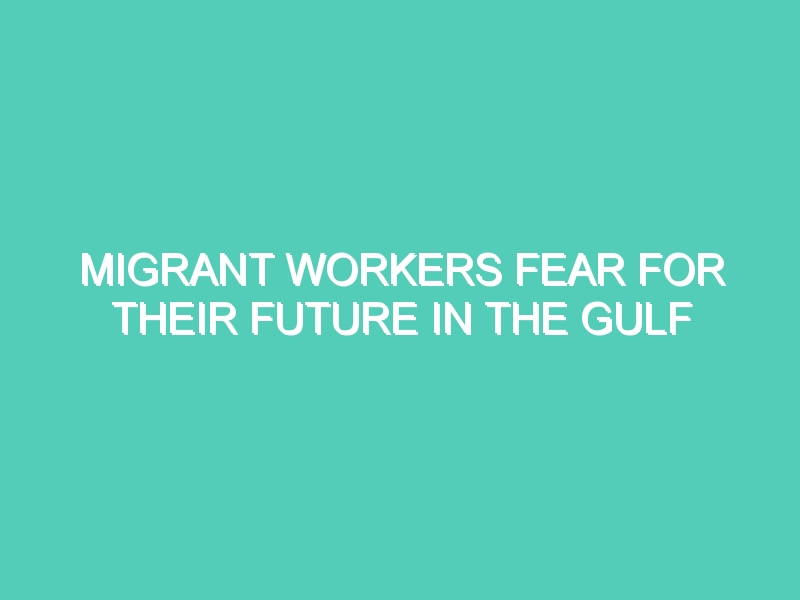Hassan is a migrant worker from Bangladesh currently working and living in Riyadh, Saudi Arabia. He shares a one-bedroom flat with 11 people, all under quarantine after one of his flatmates was tested positive for COVID-19 after a visit to the hospital following a cough and a high fever .Hassan states that the police visited that evening and placed the building under quarantine. Two days later, a doctor came to test the entire building and, another three days later, Hassan discovered that he and four other flatmates had also tested positive.
“I don’t have any symptoms as such – sometimes I feel like I have a sore-throat at night but then I think my brain is tricking me,” he says in an interview on the phone, one week after he tested positive. “What I am more worried about is money.”
While he is in quarantine, food is being provided by the government but he is uncertain about the circumstances once he recovers and can go back to his flat as his company has neither made clear when work will resume nor if he will be getting paid for his days in quarantine.
Hassan isn’t alone – human rights organizations are concerned that the millions of migrant workers in the Gulf will continue to be disproportionately affected by economic uncertainty as host countries implement containment measures to limit corona virus cases in the region. The total number of cases in the Gulf States has exceeded 20,000 with over 150 deaths and countries are continuing their ban on most passenger flights and are extending internal lockdowns and curfews to contain the number of growing cases.[1]
“This pandemic has both exposed decades of systematic racial discrimination and deepened the suffering of migrant workers who have long faced exploitation and abuse under the Gulf states’ various kafala systems,” says Hiba Zayadi, Human Rights Watch’s Gulf researcher.
The number of cases have been exponentially increasing in the Gulf states and although little information has been released by official authorities about how it is particularly affecting migrant workers, many facilities housing migrants all over the region, such as Qatar’s largest labour camp, have been under lockdowns and many companies, whose staff primarily consists of migrant labour, have also quarantined their workers after positive cases started emerging.
Saudi companies lying to the government
Bilal works for a private supermarket chain in Mecca, Saudi Arabia, and is currently one of the nearly 50 workers from his company that are quarantined after a co-worker tested positive for corona virus. The workers have all been provided individual rooms in a hotel – one of the many in the city that is typically visited by thousands of religious pilgrims – and are being provided three meals a day until the quarantine period is over.
“We are being treated well and a doctor is going to come in to take our tests soon so we can know our results before the two weeks are over,” he says. “But it really depends on the company you work for and how lucky you are – I know some people who are locked up in their regular rooms that they share with 3-4 other men. Everyone is having a very different experience because companies lie to the government.”
Several Gulf countries have announced that they will be introducing policies to alleviate the increased financial hardships migrant workers are going to face as a result of the pandemic. For instance, UAE has announced that all companies must provide housing to lay off workers until they can leave or find another job and Qatar has stated that it will cover the wages of all quarantined migrant workers.
“But time and again, groups like ours have exposed problems with implementation and enforcement of announced reforms that often stem from the kafala system that governs migrant workers itself,” says Zayadi. “I don’t see how or why, now, during this unprecedented crisis, we can trust these governments to properly implement and enforce announced measures to protect migrant workers against financial ruin.”
Uncertainty over financial security remains a common concern for migrant workers throughout the region.
“My brother is a taxi driver here and I work in construction and we are both not sure how to continue supporting our families back home,” says Faraz Khan, a Pakistani worker based in Dubai, UAE. “The company I work for has asked us to stay home but we are probably not getting paid, nobody is sure. My brother is still driving his taxi but there are hardly any passengers to pick up so it is almost like having no work.”
Suffering of domestic workers
Faraz also works as domestic help for two households that he visits on the weekends for 3-4 hours each. He is one of the many migrant workers in the region who have taken up irregular jobs as part-time work, usually working for medium-income expats who don’t have the budget to sponsor and hire full-time domestic help.
“They asked me to stop coming before the official quarantine began – one house asked me to stop coming since mid-March and the other a week after that,” he says. Both households have told him that he can visit to collect his pay once the ongoing circumstances return to normal.
People who could never imagine living without help have been doing so now because they know we live in very cramped places and are always around people so are probably more likely to get sick,” he says. “Maybe it is true, I don’t know how this disease spreads but it doesn’t matter now because the whole city has been asked to self isolate.” Faraz’s situation is not unique – the demand for domestic workers, all across the region, have steadily declined since the first cases started emerging.
Sneha, who works for a cleaning service in Sharjah, states that she has yet to be paid for March. Sneha has reached out to a few of the households she’d work at regularly and asked for financial aid because of the uncertainty she’s facing at work.
“The company says it is planning to pay us but we still haven’t received payment for March, and April is almost over. I worked regularly for a few Pakistani and Indian families and they gave me some money which is what I am surviving on right now,” she says. “We still have work though but it is lesser hours a week because hardly anyone is calling for cleaning services.”
A hostage situation
Many migrant workers, particularly those who have already lost their jobs or those who are being asked to work without pay, are also seeking to return to their countries of origin but cannot do so because of the ban on flights.
The Pakistani consulate in the UAE stated to the media that it is able to provide rations of food to those in need but flights back home have been put on hold right now. Flights to India have also been on hold since mid to late March and are expected to resume soon but no specific dates have been confirmed. Nepal has also placed a ban on most citizens returning home leaving thousands of Nepalese workers in the Gulf stranded and, often, without a roof over their heads.
The Gulf states, however, are rushing to return expat workers who no longer have jobs back home and are putting pressure on South Asian countries to allow repatriation flights back.
Some of the measures can work in favor of the stranded migrants. Kuwait is running repatriation flights, free of charge, in coordination with countries of origin and Bahrain is also allowing repatriating flights but migrants will have to pay for the tickets. Only migrants who do not have any pending debts can avail the flights.
But in other cases, however, the lack of cooperation between host countries in the Gulf and the countries of origin is leaving migrants even more vulnerable. Amnesty International reports that Qatar informed ‘hundreds of migrant workers’ that they were going for their COVID-19 tests but, instead, put them in a detention centre and then, eventually, started to send them back to their countries of origin.
“We’re already seeing states scramble to return migrant workers en masse to their countries in an attempt to wash their hands of the responsibility for them, with the UAE for example threatening to review labour ties with countries of origin that are refusing to take back their citizens, as if those workers were not the ones who carried the Gulf states’ economies on their shoulders,” says Zayadi.
SUGGESTED SOLUTIONS
- There is an urgent need to establish cooperation between the governments of different countries and such gulf nations to either make arrangements for the returning back of the stuck workforce, or provide living arrangements for them in the same country as they are stuck in. The migrant workers are currently facing an unwanted situation either ways and that’s not how the problem should be dealt with.
- There must be legislation introduced to provide salaries and wages to the migrant workforce irrespective of the services provided by them during such crisis, considering when the proportion of people living in poverty conditions in the gulf is small.
- Plane tickets for such migrant workers to fly back home should be sponsored by the government as a humane effort and concern for its citizens.
[1] https://www.opendemocracy.net/
Article Witten by- Lavanya Ambalkar
Law Student- (Symbiosis Law School, Pune)
(HRDI Work from Home Internship)



